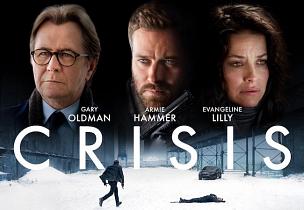‘Why Is Armie Trending?’: Crisis Director Details the Film’s Armie Hammer Crisis
Nicholas Jarecki says he had been getting lots of good news about his latest film, Crisis, when he received a text from a friend in January: “Why is Armie trending on Twitter?”
“And I’m like, I don’t even really know what ‘trending on Twitter’ means. Like, I guess I’m an Instagram guy,” Jarecki says on the latest Bret Easton Ellis Podcast.
Armie Hammer is one of the leads on Crisis, with Gary Oldman and Evangeline Lilly. Within hours, stories about purported DMs and a cannibalism fetish threatened to overshadow Jarecki’s earnest, serious-minded film about the opioid crisis. Hammer has strongly denied accusations of assault and abuse, and has not commented on the veracity of the DMs. (The accusations against him are detailed below.)
Jarecki, who made Crisis well before the accusations came to light, says on the podcast that the Hammer stories led to cancelled press coverage and negative reviews that had nothing to do with the quality of the film.
“It was a sort of slow-motion reaction,” Jarecki says. “We had all this stuff lined up. … Little by little all these things evaporated and all this press — they didn’t want to do a feature about Armie Hammer because let’s be honest, the story was Armie Hammer, cannibal. But the subtext of the story was Armie Hammer, sexual abuser. And now the further subtext, which now has become the text, is Armie Hammer, accused rapist.”
And yet Crisis still survived, he says, to win over audiences and climb to the top of the iTunes store.
Crisis faced all the same problems as most movies scheduled for 2020 — a pandemic-delayed release, questions about how to get it into theaters — but those seemed to be resolved by January. And then Hammer began trending.
Suddenly, even media appearances for actors who didn’t appear on screen with Hammer began to fall apart, Jarecki said. The director said one network was eager to have Oldman appear for an interview, but insisted, “he’s got to answer two questions about the Armie Hammer” situation.
“I think the only time they ever met each other was at a dinner I had to kick off the movie,” Jarecki says on the podcast.
The film was released on Feb. 26, with the Hammer story in full swing. There was some discussion of a delay, he said, but financial considerations came into play: “We’ve got to pay back the bank.”
Jarecki worried the Hammer situation would affect reviews for the film, but everyone assured him that wouldn’t happen.
Unfortunately, he said, it did.
“I did real tests with hundreds of people. And I knew audiences like the picture. And so, you know, the first few reviews came in and they were positive — Variety, Deadline. But then I started seeing all this wave of like, a trend — hatred, bile” because of Hammer, Jarecki says.
No one ignored the Hammer factor. The Boston Globe‘s review of Crisis, for example, advises readers: “you’re forgiven for thinking the title refers to the actor’s career.”
In his talk with Ellis, Jarecki doesn’t get into the financial specifics of Crisis, which has earned just under $1 million in theaters, according to Box Office Mojo. That doesn’t include all of its sales to Apple customers, at a price of $6.99.
Jarecki also doesn’t get into the specifics of the accusations against Hammer, given that he says his relationship with the actor was strictly professional. (Jarecki describes Hammer as a pleasant and hard-working collaborator, and adds that he “is not bad in the movie.”)
Jarecki has been on both sides of reviews. His 2012 Richard Gere financial thriller, Arbitage, was praised for tight plotting, very watchable performances and its confident handling of Wall Street corruption. It holds an 87 percent on Rotten Tomatoes.
Crisis has a 56 percent, but a 71 percent with audiences. Jarecki says he’s fine with negative ones, as long as they engage with the film, and not the circus around it.
“I was just like, this is crazy. You know, this is truly insane. Because if you wanted to come in here and say I’m a cloying manipulator who attempted to climb the prestige ladder by using the opioid crisis, okay, come at me with that attack. It’s not true, but I’ll defend myself for whatever you think my sins are.”
“But to come with the Armie of it all was really very frustrating because he’s only in a small portion of it anyway,” Jarecki says. “He’s in 40 minutes of a 120-minute movie.”




